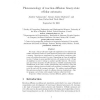66 search results - page 9 / 14 » Cellular Automata Models of Self-Replicating Systems |
RAS
2006
13 years 7 months ago
2006
Self-reconfigurable robots are built from modules, which are autonomously able to change the way they are connected. Such a robot can, through this self-reconfiguration process, c...
IJBC
2006
13 years 7 months ago
2006
We study a binary-cell-states eight-cell neighborhood two-dimensional cellular automaton model of a quasi-chemical system with a substrate and a reagent. Reactions are represented...
CEC
2007
IEEE
14 years 1 months ago
2007
IEEE
— Cellular Automata (CAs) have been investigated extensively as abstract models of the distributed systems composed of autonomous entities characterized by local interaction. How...
IDEAL
2005
Springer
14 years 1 months ago
2005
Springer
Agents make up an important part of game worlds, ranging from the characters and monsters that live in the world to the armies that the player controls. Despite their importance, a...
BIOSYSTEMS
2008
13 years 7 months ago
2008
Change of DNA sequence that fuels evolution is, to a certain extent, a deterministic process because mutagenesis does not occur in an absolutely random manner. So far, it has not ...

